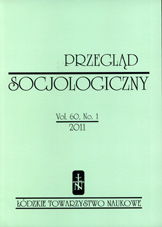The Evolution of European Identity: Using biographical methods to study the development of European Identity
The Evolution of European Identity: Using biographical methods to study the development of European Identity
Author(s): Fritz Schütze, Robert MillerSubject(s): Social Sciences
Published by: Łódzkie Towarzystwo Naukowe
Keywords: Identity; Europe; biographical narrative
Summary/Abstract: Based upon the original application to the European Commission, this article gives insights into the thinking of the Euroidentities team at the point that the project began. The question: Is the European ‘identity project’ failing? is posed in the sense that the political and economic attainments of the European Union have not been translated into a sense of identity with or commitment to Europe from the populaces that have benefited from them. The urgency of European ‘identity work’ is asserted with a number of levels for the construction of European identity being hypothesized. Euroidentities is intended to break conceptual ground by bringing together on an equal footing two apparently antagonistic views of identity – the collective and institutional and the individual and biographical – to give a more anchored and nuanced view of identity formation and transformation than either can provide on its own. Rather than following the dominant approaches to research on European identity that have been macro-theoretical and ‘top-down’, retrospective in-depth qualitative biographical interviews are planned since they provide the ideal means of gaining insight into the formation of a European identity or multiple identities from the ‘bottom up’ perspective of non-elite groups. The reliability of analysis will be buttressed by the use of contrastive comparison between cases, culminating in contrastive comparison across the national project teams between cases drawn from different ‘sensitized groups’ that provide the fieldwork structure of the project. The paper concludes with a summary of some of the more significant findings.
Journal: Przegląd Socjologiczny
- Issue Year: 60/2011
- Issue No: 1
- Page Range: 9-40
- Page Count: 32
- Language: English

